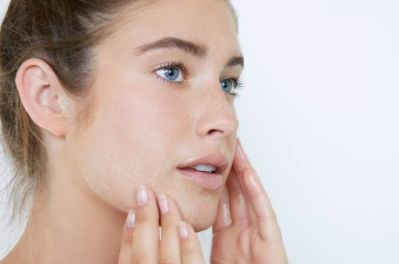
If you’re new to exfoliation as a skincare routine, you may not know there are two types of exfoliation. There’s chemical exfoliation and physical exfoliation. Whichever the case may be, this chemical exfoliation vs. physical exfoliation comparison-style article can help you. By the end of this blog post, you should know which type of exfoliation is best for your skin.
Regular exfoliation is one of the sure-fire ways to keep your skin in tip-top condition. You see, skin cells are supposed to regenerate approximately every month. But, factors such as ageing and exposure to UV sun rays can sometimes get in the way of this process.
That’s where the need to exfoliate comes into the picture. Technically, exfoliation is essentially the process of removing dead skin from your face and everywhere else. But it does so much more.
The process does everything from fading acne scars to preventing breakouts and giving you a healthy glow. Remember, we said there are two different types of exfoliation.
As such, it is essential to know which is best between chemical and physical exfoliation. Now, this is where we come into the picture.
We’ve done our homework, and now we’ll present our findings. But, instead of telling you the answer straight off like that, we’d rather you see it for yourself.
In this blog, we’ll make an in-depth comparison between chemical exfoliation and physical exfoliation. We’ll also share some of the pros and cons of chemical exfoliation and its counterparts. By the time you’re done reading, it’s safe to say you’d already have an idea of which exfoliation method is best.
But first, let’s start with the basics.
Introducing Chemical Exfoliation
Right off the bat, chemical exfoliation is the process of using facial acids to remove dead skin cells from your face. Of course, these chemical exfoliants come in varying concentrations. So, you can choose depending on your skin’s unique characteristics, such as sensitivity.
You’re probably wondering how chemical exfoliation works. We’ll tell you.
Chemical exfoliants work by separating the bonds that keep your skin cells together. Once this happens, the top, dead layers of the skin slough off, leaving healthier, regenerated skin. With continuous use, your skin will become smoother, more evenly toned, and of course, look younger than your age.
Understandably, the word ‘chemical’ may have set off internal alarms in your head. After all, most people will not like to have chemicals close to their faces, much less on it. But, we can tell you right now — there’s no need to panic. Here’s why.

Ironically, chemical exfoliation in Toronto is typically gentler than physical exfoliation options. This is because, with facial chemicals, there is no need to scrub, thereby avoiding micro-tears on your face. This is indeed one of the benefits of chemical exfoliation. Furthermore, the application of chemical exfoliants is usually in relatively small amounts.
Also, the chemicals contain soothing agents, which means they are less likely to irritate your face. Indeed, some of the facial cleansers you use already have some percentage of chemical exfoliants. Now, here comes the icing on the cake — there are different classes of chemical exfoliants.
Some chemical exfoliation acids are gentler on the skin than others. In the same way, some have less penetrating power than others. In other words, when you try chemical exfoliation treatments in Canada, the different options available mean there’s always a chemical exfoliant that’s perfect for you.
That said, here are the types of chemical exfoliants that exist:
Alpha hydroxy acids, AHAs
This acid class includes options such as citric, glycolic, citric, malic, and lactic acids. More often than not, they are fruit-derived (natural derivatives). But, it is also possible to produce them artificially.
AHAs are quite famous for their ability to improve skin texture. This is separate from their exfoliating effects. The most common options medical aestheticians recommend are glycolic and lactic acids. In this case, a 5 to 10 concentration range usually works best.
Beta hydroxy acids, BHAs
BHAs are soluble in oil, which means they can penetrate your skin pores relatively easily. Of course, they also work on skin surface level. But, Beta hydroxy acids are more popular for their deep-working effects.
Indeed, they are very effective at unclogging skin pores and removing acne-causing sebum. Some of the more common BHAs are salicylic acid alongside tropic acid.
Polyhydroxy acids, PHAs
These are similar to AHAs but with one distinctive difference. PHAs have larger molecules, which means they can’t penetrate the skin as deeply. Due to this, some people believe they are the least irritating of the chemical exfoliants.
However, the shallow reach of PHAs does not mean they are any less effective. They have relatively strong exfoliating powers with an added perk of hydrating and antioxidizing effects. Common Polyhydroxy acids include gluconolactone and lactobionic acids.
Now that you know what to expect from chemical exfoliation, let us cross to the physical exfoliation side of things.
What is Physical Exfoliation?
Physical exfoliation is essentially scrubbing your skin to remove dead skin cells. In other words, while chemical exfoliants remove the skin debris chemically, physical exfoliation requires a manual approach.
Sometimes, it involves scrubbing your face with small grains, a brush, or special equipment.
However, due to the nature of physical exfoliation, it can sometimes be harsh on the skin. Moreover, they don’t penetrate as deeply as chemical exfoliants, which may reduce their efficacy.
Indeed, a chemical exfoliation vs. physical exfoliation comparison shows that the latter loses points on efficiency and gentility. We’ll talk more about that later.
Physical exfoliants typically contain relatively small materials such as grains and nuts in varying textures. Now, here is how it works.
With physical exfoliation, you have to rub or ‘scrub’ at your skin to eliminate the layers of dead cells. Then, you will wash the scrubbing agents off your face. You should typically have a smoother and younger-looking complexion underneath. However, there is a catch — physical exfoliants can cause micro-tears in your skin.
These tears occur as a result of exfoliants that are too sharp rubbing against your skin. While these tears aren’t particularly dangerous, they may leave you with an exfoliated but uneven skin texture. This means that it is advisable for people with sensitive skin to stay away from physical exfoliating agents.
However, there are still some perks to physical exfoliation. After all, it does offer satisfactory exfoliating effects.
But, you may have to put in some work and find exfoliants that are tiny enough so that they don’t tear your skin. You may also try microdermabrasion. Although this usually takes place at a trained medical aesthetician’s office. That said, let us find out which is best between chemical exfoliation and physical exfoliation.
Related article: How Much Does Chemical Peel Cost in Toronto?
Which is Best between Chemical and Physical Exfoliation?
The truth is there is no definite answer to the chemical exfoliation vs. physical exfoliation dilemma.
You see, both offer exfoliants that get rid of dead skin cells and other surface debris. However, we believe that chemical exfoliation offers specific superiority over the physical option.

Bear in mind that we’re not just saying this because we offer top-of-the-line chemical exfoliation treatments in Canada. There are undeniable hard facts that back up our claims.
In light of this, we’ll explore some specific skin types and see what kind of exfoliation works best in that scenario.
People with active acne
If you have active acne on your face, there is no doubt that a chemical exfoliator is best for you. You see, acne is a skin infection, which means that rubbing a physical exfoliant around your face can spread the infection. This can potentially cause more acne, especially if the physical exfoliant is a rather harsh one.
On the other hand, with chemical exfoliation, you don’t have to rub or scrub anything. All you have to do is apply a thin layer of the acid agent on your face and wait for it to do its thing. Moreover, chemical exfoliants are also deep-cleaning. So, they’ll travel to the roots and heave out all the debris in your skin pores.
People with dry skin
In this case, you may opt for a physical exfoliant as they can scrub off any flaky skin alongside dead skin cells. Of course, the exfoliation process will also leave you with clearer and smoother skin.
However, chemical exfoliants can also be quite useful in scenarios like this. You see, exfoliants like the AHAs and PHAs are notable for their skin improvement, and more importantly, hydrating qualities. So, in addition to exfoliating your skin, you’re also moisturizing it with the same treatment.
People with combination skin
Combination skin means a skin type that exhibits characteristics of different kinds of skin. For instance, combination skin may be dry and oily in specific places at the same time.
If you have such skin, you’d want the tender loving care of chemical exfoliation. The reason is simple — physical exfoliants may be too harsh on your skin.
So, the wiser choice in this chemical exfoliation vs. physical exfoliation debate is this chemical option. We recommend choosing a chemically exfoliating serum that contains salicylic acid. In other words, BHAs. This way, you can enjoy an exfoliation that will not inflame or irritate your skin.

People with rapidly ageing skin
Sadly, none of us can stop age from creeping upon us. But, your choice of an exfoliant can go a long way in determining how well your age looks on you. If you’re looking to fight the effects of ageing effectively, we recommend using chemical exfoliants.
For instance, alpha hydroxy acids are quite adept at diminishing age lines and deep wrinkles. They can also help to improve your general skin texture while giving you that coveted youthful glow. On the other hand, some physical exfoliating agents also offer some commendable anti-ageing results.
People with sensitive skin
Skin sensitivity is an extremely delicate condition. So, there is an understandable need to tread carefully. That said, most people with sensitive skins will benefit from chemical exfoliation in Toronto.
In this case, we will advise polyhydroxy chemical exfoliants. They do not penetrate the skin as deeply and also have hydrating as well as anti-oxidizing properties. However, there is still a need to be careful while trying them.
Another option is to try mild, small-grained physical exfoliants. These usually exfoliate on a more superficial level. So, they are less likely to irritate your skin.
Regardless of the choice you make, we recommend testing the exfoliant once in the space of a week. Then, if your body exhibits a positive reaction, you may increase the frequency to twice or thrice weekly.
People with scarring or hyperpigmentation
The best form of exfoliation to reduce the visibility of scars and hyperpigmentation is undoubtedly chemical.
For instance, Beta hydroxy acids generally improve the turnover of skin cells, which helps to minimize scar lines. Also, glycolic acid (an AHA) has some applications in improving hyperpigmentation on the skin.
Why You Should Choose Chemical Exfoliation
By now, you may have already noticed we lean towards chemical exfoliation. However, considering the various advantages of the exfoliation process, it should not surprise you.
In recent times, chemical exfoliation has soared so much in popularity and here are some of the top reasons:
- They are relatively easy to use.
- They offer more uniform, all-around exfoliation.
- They do not cause skin tears or related exfoliation mishaps.
- They are an extensive range of acid options and combinations for every skin type.
- They are deep-acting, which means they exfoliate your skin pores from the roots or close.
- They are ideal for sensitive or delicate skin.
Final Take
At the end of it all, your choice of exfoliation method hinges on your personal preference. However, we hope our chemical exfoliation vs. physical exfoliation comparison has helped you make a decision on which treatment is best for you.
Chemical exfoliation has a world of advantages over physical exfoliation, and most of our clients think so too.
Book Free Consultation
"*" indicates required fields
-
Facebook
-
Twitter
-
Linkedin






